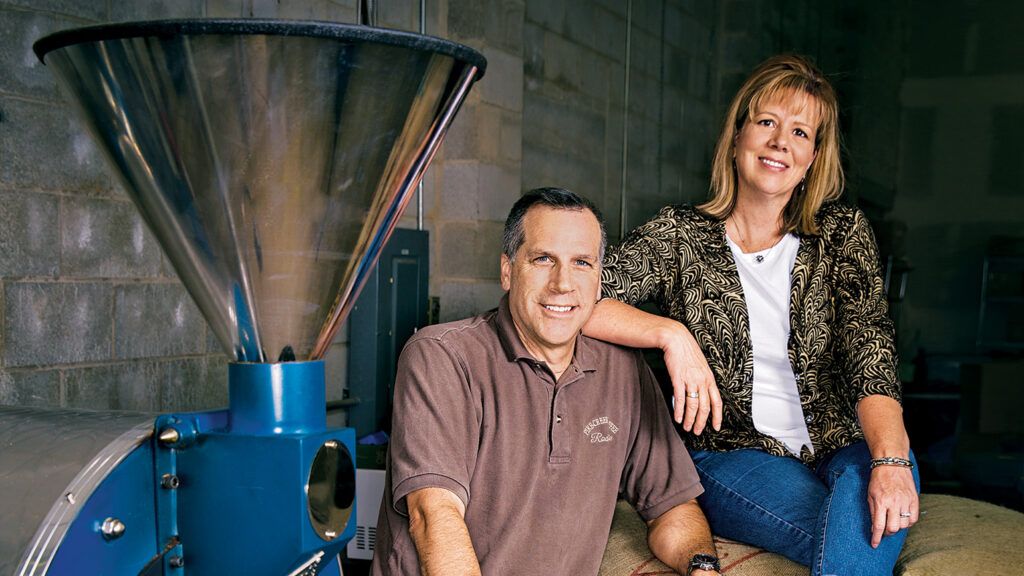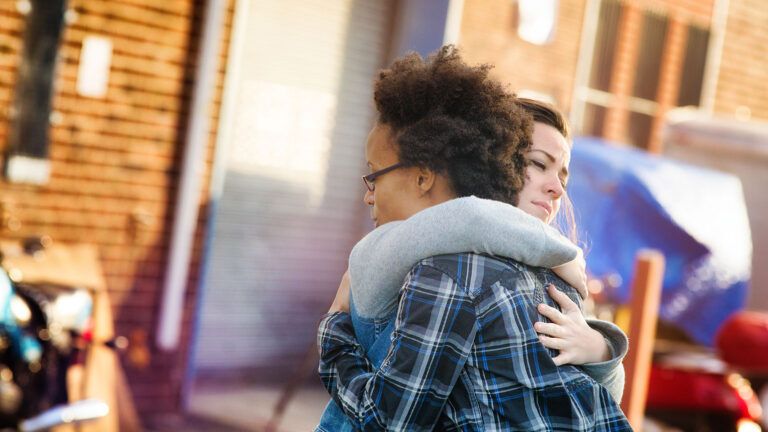My husband, Peter, and I love coffee. Good coffee, the kind you grind just before you brew it, so all the complex flavors of the beans waft up as you take that first perfect sip of the morning. The prep time is no hassle. I love the ritual of it, the way it slows me down and helps me to savor the promise of a new day.
A few years ago, that ritual was more than pleasure. It was my lifeline. Measuring beans, grinding them, pouring the water—I could stay on top of that. Everything else in our family was falling apart.
Peter had been in a car accident. Another driver broadsided him as he waited at a stop sign. By the time I reached the accident site, Peter was on the ground having a seizure.
He’d suffered a traumatic brain injury. He was a vice president at a home-building company, a numbers guy who could calculate 30-year mortgages in his head. After the accident, he struggled with basic math and lost his career. He had trouble walking. He was sent for a month to a hospital specializing in brain injuries, then for therapy at a rehab center in Philadelphia, followed by months spent working with physical-therapy students at the University of Delaware.
After all that, he was able to walk, but he still puzzled over how many quarters are in a dollar. He couldn’t recognize his niece in a family photo.
If it had just been an injury followed by recovery, I could have handled it. We are faithful people, and I prayed every day for strength and guidance. Peter did too.
Those prayers didn’t help Peter’s spirit. He sank into a profound depression. He’d been a successful professional, tethered to his cell phone, always working and achieving. A year after the accident, he was struggling to find meaning in life. Our nine-year-old son, A.J., was thrilled to have his dad home. But Peter was only half home. He confessed to me he didn’t see the point of living anymore.
“I hate it when people at church tell me how great I’m looking,” he told me one day. “They see me walking and think I’m fine. I’m not fine. I’m damaged.”
I couldn’t reassure Peter. Maybe it was because I felt the loss of his old self too. I felt that huge missing piece of him and it scared me. Our life had been good before the accident. Peter loved his work, and his salary enabled me to work part-time as a freelance graphic designer while A.J. was at school. We’d been all set to build our dream home. We’d picked out property, finalized building plans and arranged financing.
Now I was our sole source of income, and we had huge medical bills after Peter’s insurance ran out. The dream home, obviously, was out of the question. I worked nonstop and still we struggled. I was exhausted, growing frantic about Peter. He was caught in a vortex of negative thoughts, dark thoughts. But what could I do? Physical caregiving I could handle. But how do you care for the soul?
Early one morning, I was by myself in the kitchen. I measured coffee beans into the grinder and pushed the button. As always, the whir of the machine settled me. I closed my eyes, taking in the rich, fresh smell.
Opening my eyes, I saw the scoop I’d just used to measure the beans. The other day I’d watched Peter using it to make himself some coffee. I’d been pleased to see he could measure the coffee correctly.
Wait a minute, I thought. Was there more to that? Peter and I loved coffee. It was our morning ritual and made both of us happy. Peter felt competent making coffee.
I’d heard of people buying raw coffee beans and roasting them at home. I’d always chuckled at that. Foodies and their fancy fads! But…what if it could help Peter?
“We should try roasting our own coffee beans,” I said to him when he got up. “Wouldn’t that be fun?” “We don’t have a roaster,” Peter said.
“We could buy one if it’s not too expensive. Why don’t you do some research online?”
Peter looked at me quizzically. Then I saw a spark of something. A little bit of the Peter who liked to tackle a project. To work. To achieve.
“I guess I can try,” he said.
One byproduct of Peter’s injury was a tendency toward thoroughness bordering on obsession. He found it hard to remember basic tasks, yet he could arrange the glasses in our cupboards by shape, size and color. He went at the coffee-roaster project the same way. Soon he had read everything he could get his hands on about roasting coffee. Now it was time to get him roasting.
On eBay I stumbled across a guy named Chris who sold coffee roasters. One day, while A.J. was in school, Peter and I drove to Chris’s warehouse. He showed us a small roaster, about two and a half feet long.
Peter watched as Chris poured in some raw green coffee beans and turned the roaster on. The machine heated to just above 400 degrees, slowly rotating the beans in a small drum. Soon we heard crackling sounds as the beans dried and the oils burst to the surface—the sound reminded me of popcorn popping. Ten minutes later, Chris opened a small hatch and dark, fragrant coffee beans poured out.
Peter’s eyes lit up. He peered at the roaster. “Wow,” he said. “That’s what I want to do.”
“We’ll take it,” I said.
That afternoon, A.J. watched as we roasted our first batch of raw beans, bought from Chris. We ground the roasted beans and brewed them. The kitchen smelled like a café, though the roaster produced a lot of smoke.
Peter took the first sip. “This is amazing!” he exclaimed. The coffee truly was delicious. Complex. Bright. Full of flavors I’d never tasted in a cup of coffee before. This was a completely different experience.
“Let’s make some for the neighbors,” Peter said.
“Let’s put the roaster in the shed first,” I said, fanning my hands to disperse the smoke.
The next several mornings, Peter disappeared into the shed. He tried different temperatures, different roasting times. We got very caffeinated. I didn’t care. For the first time since the accident, my husband was happy and absorbed in a task. Concentrating in a way he hadn’t in ages.
The neighbors were impressed with the samples and asked for more. Soon we had more coffee than we could give away. I didn’t tell Peter to stop. I ordered small bags online and had them printed with a logo I designed, a hen (for Delaware’s state bird) sitting on some coffee beans. We decided to call our operation Pike Creek Coffee, after our community.
I took one of the bags to a farm produce stand and asked if they’d sell it. “Sure—on consignment,” they said. I brought several bags. They sold out.
I went to our local family-owned supermarket with some coffee.
“Your husband’s the guy who was in the car accident?” the manager asked. “Sure, we’ll sell it. I’d love to try some.”
Our town newspaper wrote a story about us. Soon we were selling quite a bit of coffee at the grocery store and people were asking if they could buy it online. I designed a simple website. The story in the paper must have gotten passed around. Suddenly we had a lot of customers!
The little roaster couldn’t keep up with demand. Peter was out there for much of the day. Sometimes he lost track and burned beans. But he kept at it. And the orders kept coming. Then a neighbor complained about the coffee smoke wafting from our shed and the county told us we could no longer roast in our backyard. We faced a decision. We’d either have to expand and turn this operation into a real business, with employees, or we’d have to shut down the website.
We couldn’t shut down. Peter needed this work. Every morning he headed out to the shed with a clear sense of purpose. With optimism.
“When I go roast coffee, I feel like I’m going to work,” he said to me one day. “I’m pretty good at it now. People like it.”
The look in his eyes said even more. Yes, Peter was no longer a vice president. We had less money. More stress. He still struggled with feelings and everyday challenges in a way we never could have expected.
But he was home every day for dinner. He went to A.J.’s lacrosse games. And he roasted coffee. We loved knowing that people from all over the country woke up in the morning and enjoyed a gift he gave them. Peter felt valued again and he knew that in God’s eyes, he always had been and always would be.
So we expanded. I found some cheap warehouse space to rent. We bought a larger roaster and hired help.
The profit from the coffee sales is modest. The spiritual profit is incalculable. You could say our lives are like good coffee in so many ways now. We’ve been through the fire and we came out deeper and stronger. Some days there is bitterness, yes. But the flavor is so much more complex. And with it comes greater liveliness. A sense that this day too holds promise and blessings. How do you care for someone’s soul? God showed me how, one bracing, satisfying cup at a time.
For more inspiring stories, subscribe to Guideposts magazine.






